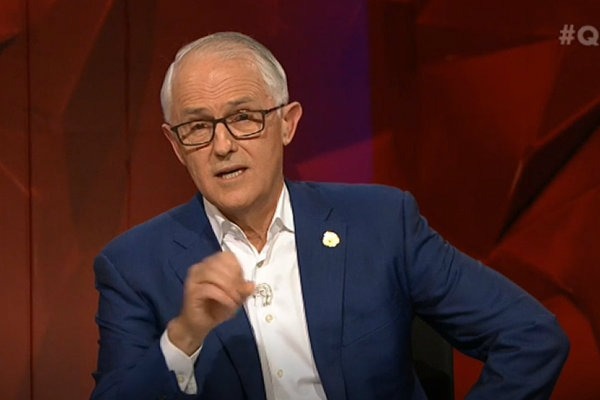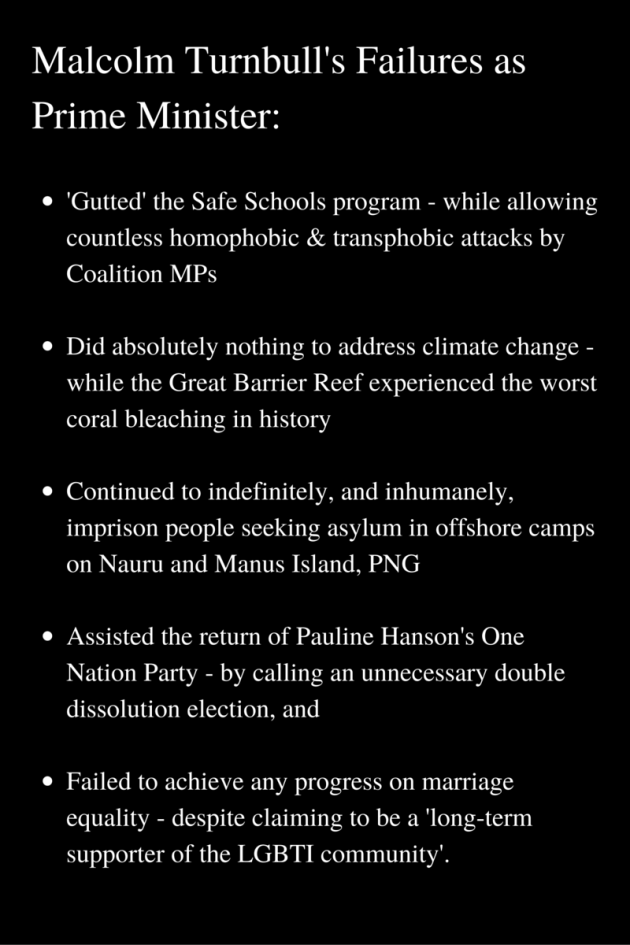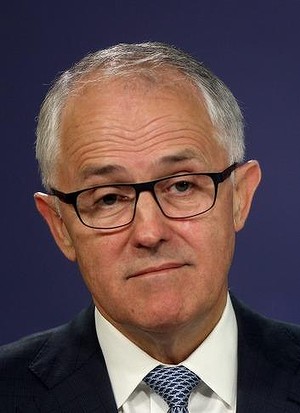Next Thursday, 15 November, is the one-year anniversary of the announcement of the results of the same-sex marriage postal survey, in which 61.6% of Australians said yes to equality.
And December 7 will mark 12 months since the passage of the Marriage Amendment (Definition and Religious Freedoms) Act 2017, which finally legalised same-sex marriage in this country.
With both milestones rapidly approaching, it is likely we will witness a large number of Liberal Party MPs and Senators try to claim credit for achieving marriage equality.
Indeed, now-former Prime Minister Malcolm Turnbull kicked off this predictable right-wing festival of self-congratulation on Thursday night’s QandA,[i] commenting that:
“You know, think of the big social reforms, legalising same-sex marriage. I mean, what a gigantic reform that was, I was able to do that … I legislated it, right? So I delivered it.”
This statement is about as far removed from the truth as the nonsense that emanates daily from Donald Trump’s twitter account.
Rather than ‘delivering’ this important reform, the Liberal Party was in fact the greatest obstacle standing between LGBTI Australians and the right to marry.
In case you disagree – or have forgotten the destructive role played by the Liberals on this issue over many years – here’s a reminder of what they actually did:
- The Liberal Party banned marriage equality in the first place
It was John Howard’s Liberal-National Government that prohibited same-sex marriage in August 2004.[ii] While this was prompted by couples who had wed overseas seeking recognition of their marriages under Australian law, it was primarily motivated by the desire to wedge the Labor Party on this issue ahead of the federal election later that year. Sadly it would not be the last time the Liberal Party played with the lives of LGBTI people for base political reasons.
- The Liberal Party refused to allow Australians to marry overseas
The Howard Liberal-National Government actually went further than merely refusing to recognise the marriages of couples who had wed overseas. They then refused to issue Certificates of No Impediment to Australians who wanted to get married in countries where it was legal, even where one member of the couple was from the other, more-progressive country. This was an incredibly petty and mean-spirited move.
Fun Fact: The Attorney-General who implemented this pathetic policy was the same person who led the recent Religious Freedom Review which recommended that religious schools continue to be allowed to discriminate against LGBT students and staff, one Philip Ruddock.
- The Liberal Party voted against marriage equality in September 2012
It took eight years before there was a genuine opportunity to repeal the Howard Liberal-National Government’s ban on same-sex marriage. In late 2012, Parliament voted on ALP MP Stephen Jones’ private members’ bill.
In line with the hard-fought, and hard-won, decision at its December 2011 National Conference, the Gillard Labor Government gave its members a conscience vote. The majority of ALP MPs and Senators voted in favour of marriage equality.[iii]
On the other hand, every single Liberal Party MP and Senator, bar one, voted against same-sex marriage. That includes then-Opposition Leader Tony Abbott, Malcolm Turnbull, Scott Morrison, George Brandis and Dean Smith. The only notable, and noble, exception was Queensland Senator Sue Boyce.
The Liberal Party cannot expect to be rewarded for the fact that same-sex marriage was legalised on December 2017 when they were the ones who stopped it from being passed more than five years earlier.
- The Liberal Party refused to hold a parliamentary vote on marriage equality
Following its election in September 2013, Tony Abbott’s Liberal-National Government simply refused to hold another ordinary parliamentary vote on same-sex marriage. This recalcitrant approach continued even after it became apparent the majority of MPs and Senators now supported marriage equality.
- The Liberal Party challenged the ACT’s same-sex marriage laws
While the Abbott Liberal-National Government did absolutely nothing to achieve marriage equality in Commonwealth Parliament, they did take action in at least one area: they challenged the validity of the recently-passed ACT Government’s same-sex marriage laws in the High Court.
In fact, this was one of the first things the newly-elected government did on any issue, full stop, revealing its fundamental priority was to stop marriage equality in any way possible.
This challenge was ultimately successful, meaning that the marriages of 31 couples were effectively annulled.
Fun Fact: The Attorney-General who instigated this High Court challenge, that overturned the marriages of 62 people who his own Government would not allow to marry because of their sexual orientation and/or gender identity, would later claim that marriage equality was one of his, and his Government’s, greatest achievements, one George Brandis.
- The Liberal Party proposed an unnecessary, wasteful, harmful and divisive plebiscite
In August 2015, with public support for marriage equality continuing to build, and the Abbott Liberal-National Government under mounting pressure to finally do something on this topic, they chose not to do the one thing that would actually resolve it (hold a parliamentary vote).
Instead, after a six-hour joint party-room meeting, they proposed a same-sex marriage plebiscite. Despite changing leaders the following month, new-Prime Minister Malcolm Turnbull continued to support this policy, including in the lead-up to the 2016 Federal election and beyond.
A plebiscite like this was essentially unprecedented – there had been only one plebiscite in the previous 98 years, and that was on the national anthem. It was unnecessary, and – at an estimated cost of $158.4 million – it was fundamentally wasteful too. LGBTI Australians also justifiably feared that, subjecting our relationships and rights to months of public debate would be incredibly divisive, and cause significant harm to the most vulnerable members of our community.
It should be remembered that the idea for a plebiscite was only being pushed by those who opposed marriage equality, including Abbott himself, the Australian Christian Lobby and other religious extremists. It was never designed with the best interests of the LGBTI community in mind.
- The Liberal Party held an unnecessary, wasteful, harmful and divisive postal survey
After months of intense lobbying by LGBTI community advocates and organisations, the ALP, Greens and members of the cross-bench rejected the Turnbull Liberal-National Government’s plebiscite in the Senate in October 2016.
Despite this, Prime Minister Turnbull and the Coalition still refused to hold a straight-forward parliamentary vote. Instead, in August 2017 they proposed a same-sex marriage ‘postal survey’.
This was even more unprecedented, and was an abuse of the power of the Australian Bureau of Statistics’ power to collect, well, statistics. Despite the fact the High Court found it was technically lawful, it could at best be described as ethically dodgy, and at worst a perversion of Australian democracy.
Like the plebiscite, the postal survey was entirely unnecessary, and completely wasteful, ultimately costing taxpayers $80.5 million. And for LGBTI Australians and rainbow families its impact was exactly as bad as anticipated, unleashing a torrent of homophobia and transphobia, with the worst attacks of the bigoted No campaign reserved for trans and gender diverse young people.
Of course, the architects of the postal survey didn’t care about this negative outcome. Because the postal survey was never about us. It was put forward as a quick political fix for the Liberal Party, who knew they couldn’t continue to oppose marriage equality in the lead-up to the 2019 Federal election, but whose homophobic party-room members refused to hold a parliamentary vote without conducting a costly (in multiple senses of the word) public debate beforehand.
And if you disagree with this analysis, perhaps you’ve forgotten whose idea the postal survey was, one Peter Dutton.
- The Liberal Party didn’t actually pass marriage equality
This point might sound strange (especially to new readers of this blog), but it is an important one to make. Because while Liberal Senator Dean Smith’s Marriage Amendment (Definition and Religious Freedoms) Act 2017 finally granted same-sex and gender diverse[iv] couples the right to marry, it did not deliver true equality.
A hint lies in the title. This legislation did not just amend the Marriage Act 1961 to ensure marriage was available to all couples, it also added new rights for individuals and organisations to discriminate against LGBTI couples on the basis of religious prejudice.
This included permitting existing civil celebrants to register as ‘religious marriage celebrants’ and consequently putting up signs saying ‘no gays allowed’. These are not ministers of religion, and the ceremonies they conduct are not religious. But the law, as passed, allows these individuals to discriminate on the basis of their homophobia and transphobia.
Smith’s Marriage Amendment (Definition and Religious Freedoms) Act also introduced offensive provisions allowing discrimination by religious organisations in the Marriage Act itself. This includes section 47B:
A body established for religious purposes may refuse to make a facility available, or to provide goods or services, for the purposes of the solemnisation of a marriage, or for purposes reasonably incidental to the solemnisation of a marriage, if the refusal:
(a) conforms to the doctrines, tenets or beliefs of the religion of the body; or
(b) is necessary to avoid injury to the religious susceptibilities of adherents of that religion.
Similar provisions allowing discrimination by religious organisations already existed in the Commonwealth Sex Discrimination Act 1984, so at best they were unnecessary here. At worst, because this amendment was phrased as a ‘positive right’, this allows new discrimination, in particular because it is more likely to overrule the better anti-discrimination laws of some states and territories (especially Tasmania’s Anti-Discrimination Act 1998).
It should be noted that these discriminatory provisions were not previously required with respect to divorced people remarrying – another issue on which there are strong religious beliefs. The fact they were introduced last year reveals they were motivated not by so-called ‘religious freedom’, but by homophobia and transphobia masked in that language.
By introducing new forms of discrimination, Dean Smith’s Marriage Amendment (Definition and Religious Freedoms) Act 2017 delivered same-sex marriage, but it most definitely did not achieve marriage equality.[v]
- The majority of Liberal Party MPs and Senators voted for even more discrimination
Despite the fact the Smith Bill did not deliver equality to begin with, the majority of Liberal Party MPs and Senators voted in favour of at least some (and in some cases all) of the amendments that would have allowed even more discrimination against LGBTI couples.[vi] The only reason these were defeated was because all ALP and Greens MPs and Senators opposed them, alongside a small minority of Coalition parliamentarians.
These (thankfully rejected) amendments included granting individuals the right to discriminate in the provision of goods and services on the basis of their ‘religious marriage beliefs’, as well as personal views that same-sex relationships are wrong, or that trans people don’t exist.
The then-Attorney-General, George Brandis, even tried to incorporate Article 18 of the International Covenant of Civil and Political Rights into the Marriage Act 1961 (through an amendment that ‘Nothing in this Act limits or derogates from the right of any person, in a lawful manner, to manifest his or her religion or belief in worship, observance, practice and teaching’) while conveniently ignoring the limitation in Article 18(3): that religious freedom can be limited to protect the fundamental rights and freedoms of others (including the right to non-discrimination). Oh, and he moved an amendment that all civil celebrants should be able to discriminate against LGBTI couples because of their personal religious or conscientious beliefs.
It is offensive for Liberals to now claim credit for delivering marriage equality when the majority of them voted for it not to be equal.
Fun Fact: Our new Prime Minister, Scott Morrison, voted for every amendment in the House of Representatives that sought to increase discrimination against LGBTI couples. This included supporting having two different definitions of marriage (one for ‘traditional marriage’ – the union of a man and a woman to the exclusion of all others, voluntarily entered into for life – and one for everybody else – the union of 2 people to the exclusion of all others, voluntarily entered into for life). He also introduced his own amendments to the Bill, which included protecting individuals who discriminate against others because of transphobic beliefs that ‘the normative state of gender is binary and can, in the overwhelming majority of cases, be identified at birth’. He might now be Leader of the country, but with views like that he’ll never be a true leader.
- Even after the postal survey, a significant minority of Liberal Party MPs and Senators voted against same-sex marriage
The Liberal Party banned marriage equality in 2004. They voted against it in September 2012. They refused to hold a simple parliamentary vote following their election in 2013. They tried and failed to hold a plebiscite in 2016. They ‘succeeded’ in holding a postal survey in 2017, in which more than three-in-five Australians said yes to equality.
After forcing us wait for 13 years, and making us jump through hoops that no other group in Australia has ever had to before (and hopefully none will have to again), a significant minority of Liberal MPs and Senators still couldn’t bring themselves to vote for the ability of all couples to marry, irrespective of sexual orientation or gender identity.
In the Senate, Liberals Concetta Fierravanti-Wells, Eric Abetz and Slade Brockman, and Nationals John Williams, Matt Canavan and Barry O’Sullivan, voted no. While Liberal Senators Michaelia Cash, David Fawcett, James McGrath and Zed Seselja, and National Bridget McKenzie, all abstained.
In the House of Representatives, Liberal Russell Broadbent, and Nationals Keith Pitt and David Littleproud, voted no. Whereas Liberals (ex-PM) Tony Abbott, Andrew Hastie, Michael Sukkar, Kevin Andrews, (now-PM) Scott Morrison, Rick Wilson, Stuart Robert and Bert van Manen, and Nationals Barnaby Joyce and George Christensen, all abstained.
After subjecting LGBTI Australians to an unnecessary, wasteful, divisive and harmful postal survey because of their own internal political divisions, the fact that these 24 Liberal and National MPs could not even respect its outcome by voting yes in parliament shows the absolute contempt that they hold for us and our relationships. Their disgusting behaviour should not be forgiven nor forgotten.
**********
These ten points unequivocally demonstrate that same-sex marriage was achieved in Australia in spite of the Liberal Party, not because of them.
So, in the coming weeks, if any Liberal MP or Senator tries to claim credit for achieving marriage equality, tell them to get in the bin.
Because that is where such garbage claims belong.

Former Prime Minister Turnbull on QandA, where he tried to claim credit for marriage equality. Hey Malcolm, Get in the Bin.
If you have enjoyed reading this article, please consider subscribing to receive future posts, via the right-hand scroll bar on the desktop version of this blog or near the bottom of the page on mobile. You can also follow me on twitter @alawriedejesus
Footnotes:
[i] Not that I was watching: I was not interested in hearing from the fakest of fake (self-declared) friends of the LGBTI community. This quote is from a transcript in CrikeyWorm.
[ii] Yes, this was done with the support of the then-Latham (!) Opposition, a move that also warrants criticism – but Labor will not be the ones falsely claiming credit for marriage equality in the coming weeks.
[iii] Of course, then-Prime Minister Julia Gillard voted against equality, something for which she should be forever condemned.
[iv] Although trans and gender diverse people are still waiting for forced trans divorce laws to be repealed in some jurisdictions (noting that if they are not repealed by 9 December 2018 the Commonwealth Sex Discrimination Act 1984 will overrule them).
[v] There is a second, more technical, argument why the Liberal Party didn’t actually pass marriage equality. That is because the Marriage Amendment (Definition and Religious Freedoms) Act 2017 was a private members’ bill. It was not Government legislation, so its passage cannot be claimed as an achievement of the Liberal-National Government. Indeed, as a private members’ bill, more ALP MPs and Senators voted for it than Liberal and National ones.
[vi] This includes then-Prime Minister Malcolm Turnbull, who voted for three different sets of amendments increasing discrimination against LGBTI couples, while abstaining on the others.










